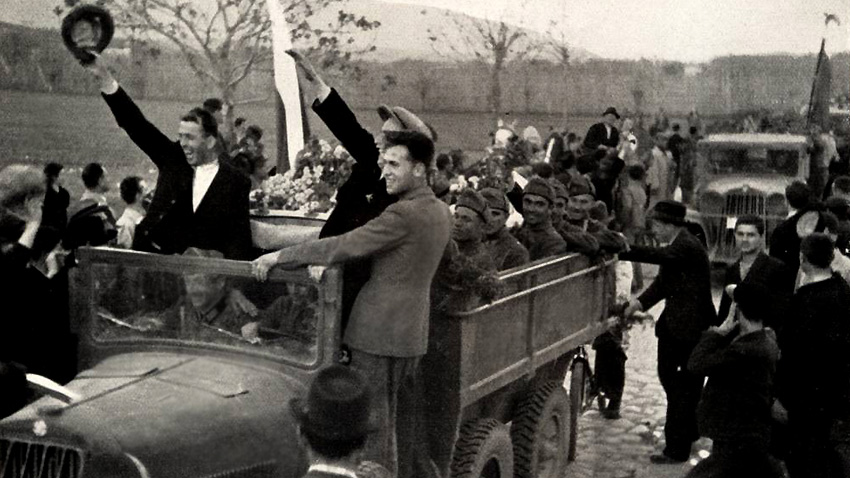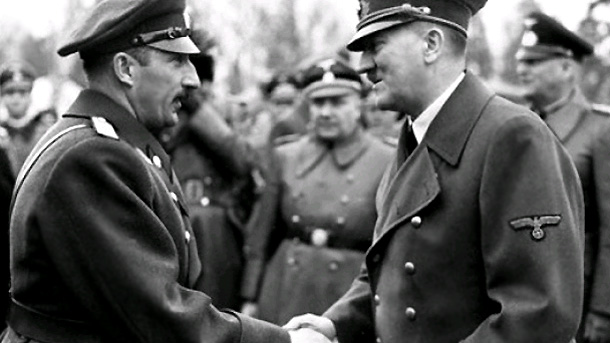The Golden Archive of the BNR keeps a record of a parliamentary speech of Tsar Boris III:
“Dear Bulgarian MPs! I am happy to see you gathered here today again in this sacred building and I do say: welcome! Our country’s foreign policy in these faithful times is now clear. It is being conducted by the government with determination within the Tripartite Pact and the pact against the Comintern. This policy is based on our true friendship and sincere cooperation with the Axis powers and their allies. Bulgaria is ready to cooperate for the building of a new European order, which will secure peace for good. Dear MPs, our hard-working people is fully aware of the historical moments that we are going through and appreciates the measures of the government for countering any anti-governmental activities; we are standing in unity together.”
The government did have a strong public support at that moment, as it had managed to prevent any military rout, had not sent Bulgarian troops at any front, joining at the same time nearly all territories, inhabited by Bulgarians. However, that success didn’t last long. In the end of the same year the government declared, under German pressure, the so-called Symbolic War to the USA and England. Its non-symbolic consequences were heavy bomb attacks against Sofia and other towns in 1943 – 1944. That short unification could not be legitimized, as there were no signatures of the Great Powers involved. Thus in 1944 Bulgaria had to shrink back into its old territory, with huge reparations as a burden – a result from its Tripartite Pact participation. However, why did the country join the pact and could it be avoided? The chronology of the events was the following:

Despite the constant pressure of both Germany and the USSR, despite the shuttles of American and British diplomats, the state tried to resist as long as possible and opted for neutrality. In October 1940 Tsar Boris III refused an accession to the Tripartite Pact, offered by Benito Mussolini, in order for this country to join the war against Greece “for the liberation of Bulgaria’s Belomorie and Aegean Macedonia. In November 1940 Soviet foreign affairs commissar Molotov tried to bargain the joining of the USSR to the Tripartite Pact for the German agreement on Bulgaria’s entering the Soviet sphere of “protection guarantees”. Right after that attempt Hitler sent his second invitation to Tsar Boris III, but the latter managed to stave it again. At the same time Hungary, Romania and Slovakia failed to do the same and had to join the pact. German troops penetrated the Romanian territory. In the beginning of 1941, amidst a very tense situation, it became clear that half a million German troops, concentrated at the southern Romanian Danube border, would have to cross Bulgaria one way or another, in order to support the Italian army in Greece.
 Bulgaria faced no other choice, but joining or occupation with thousands of victims. Tsar Boris III had two options. The first one was emigration and leaving the country behind. The other one was avoiding of occupation with all its consequences, such as thousands of victims and the entering of Bulgarian troops into the war. That was why he gave the green light to the government of Bogdan Filov to sign in Vienna the joining to the Tripartite Pact, keeping the status “non-participant in war”. Though Bulgaria was an ally of Germany, it didn’t break its diplomatic relations with the USSR and did not send troops to the Eastern Front. Tsar Boris III refused to send even a single rifle there at the last meeting with Hitler as well and a few days later he passed away quite mysteriously.
Bulgaria faced no other choice, but joining or occupation with thousands of victims. Tsar Boris III had two options. The first one was emigration and leaving the country behind. The other one was avoiding of occupation with all its consequences, such as thousands of victims and the entering of Bulgarian troops into the war. That was why he gave the green light to the government of Bogdan Filov to sign in Vienna the joining to the Tripartite Pact, keeping the status “non-participant in war”. Though Bulgaria was an ally of Germany, it didn’t break its diplomatic relations with the USSR and did not send troops to the Eastern Front. Tsar Boris III refused to send even a single rifle there at the last meeting with Hitler as well and a few days later he passed away quite mysteriously.
500,000 Bulgarian troops entered the war, when Bulgaria switched sides and joined the Allies in the autumn of 1942. Around 32,500 soldiers and officers gave their lives till the end of the war. Despite the contribution of its army, the country remained isolated and fell into the Soviet sphere of influence.
English version: Zhivko StanchevAfter winning the general election on 18 December 1994, the Bulgarian Socialist Party formed a government of non-partisan experts, members of the political club called Ecoglasnost and members the Bulgarian Agrarian National..
In the summer of 1994 Bulgaria marked its 6 th participation in world finals. It was the 1994 FIFA World Cup and 9 months earlier God had become a Bulgarian for while. On 17 November 1993 a decisive battle took place at the Parc des Princes stadium in..
On December 30, 1992, President Zhelyu Zhelev’s economic advisor Professor Lyuben Berov became Bulgaria’ s new Prime Minister right after the fall of the cabinet headed by Premier Philip Dimitrov. Lyuben Berov was in charge of the country for two whole..

+359 2 9336 661
